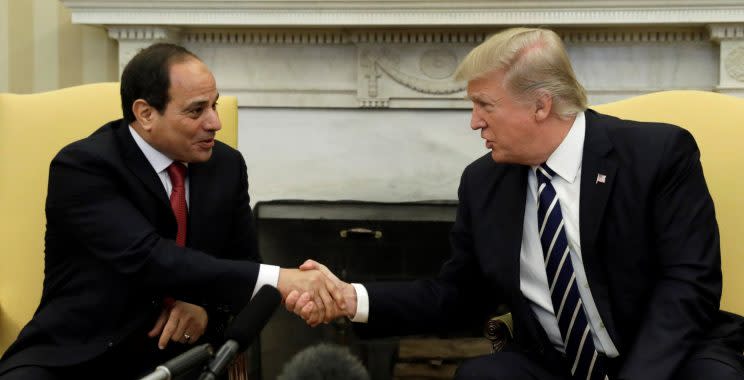Meeting Egypt’s Sisi, Trump publicly silent on human rights
WASHINGTON — During the 2016 campaign, Donald Trump sometimes bluntly condemned the Obama administration for not doing more to publicly promote human rights across the Muslim world. But now that he has reached the White House, Trump has muted those concerns — notably declining to raise them publicly as he met Monday with Egyptian President Abdel Fattah al-Sisi.
“I just want to let everybody know, in case there was any doubt, that we are very much behind President al-Sisi. He’s done a fantastic job in a very difficult situation,” Trump said as he welcomed Sisi to the Oval Office. “We will fight terrorism and other things, and we’re going to be friends for a long, long period of time.”
Since taking office, Sisi has drawn sharp criticism for his human rights record, which includes reports of widespread arbitrary arrests and torture.
It’s hardly unusual for candidates to speak in uncompromising tones from the stump only to discover nuance and the cold-blooded calculation once inside the West Wing’s Situation Room. Trump aides have made little secret of their plan that the United States will work with virtually anyone who will help to defeat the so-called Islamic State and counter Islamist extremism more broadly.
Every U.S. president struggles to balance human rights with national security imperatives, sometimes leading Washington to work with allies and partners with terrible human rights records. But on several occasions in 2016, Trump had harsh words for the Obama administration about what he described as a failure to stand up for American values.
In a September speech in Pensacola, Fla., the entrepreneur charged that as secretary of state, Hillary Clinton “cozied up to regimes that oppress and brutalize women, that murder gays, and that violate human rights on an unimaginable scale,” and promised: “My administration will be a voice for all people who are oppressed, including the millions of women being oppressed by radical Islam.”
In remarks in Youngstown, Ohio, a month before that, Trump took aim at Obama’s June 2009 speech in Cairo.
“In winning the Cold War, President Ronald Reagan repeatedly touted the superiority of freedom over Communism and called the USSR the Evil Empire,” Trump said. “Yet when President Obama delivered his address in Cairo, no such moral courage could be found or would be found. Instead of condemning the oppression of women and gays in many Muslim nations, and the systematic violations of human rights, or the financing of global terrorism, President Obama tried to draw an equivalency between our human rights record — and remember this, our human rights — and theirs. The records are unbelievable and unmistakable.”

But with Trump now in office, human rights advocates worry about some early messages his administration has sent. The White House removed restrictions on arms sales to Bahrain that were imposed because of concerns about repression there. And Secretary of State Rex Tillerson did not personally unveil the State Department’s annual human rights report.
And on Friday, a senior Trump adviser said the president would move those criticisms to behind-the-scenes conversations — dramatically reducing the pressure that comes with a public scolding.
“Human rights are always an issue of concern to the United States, and they’re first and foremost in our discussions,” the official told reporters. “Our approach is to handle these types of sensitive issues in a private, more discreet way. And we believe it’s the most effective way to advance those issues to a favorable outcome.”
Asked by Yahoo News whether Trump had raised human rights concerns with Sisi during their private meeting, White House press secretary Sean Spicer declined to answer.
“I’m not going to get into what they discussed privately,” he said during his Monday media briefing, “but I will tell you that we understand the concern, and I think those are the kinds of things that I believe progress is made privately.”
Read more from Yahoo News:
Trump rehashes Democratic primary debate controversy to deflect from Russia probe
EPA chief admits climate change is real — but ‘the real issue is how much we contribute to it’
‘Our Dishonest President’: L.A. Times editorial eviscerates Trump
Photos: St. Petersburg metro blast: At least 10 dead in Russian subway station explosion



